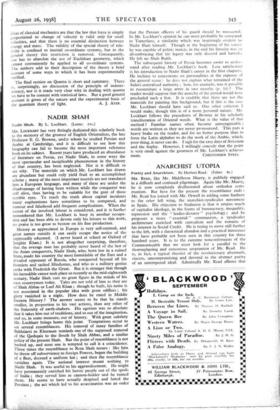NADIR SHAH
Nadir Shah. By L. Lockhart. (Luzac. 2 Is.)
MR. LOCKHART has very fittingly dedicated this scholarly book to the memory of the greatest of English Orientalists, the late Professor E. G. Browne, under whom he studied Persian and Arabic at Cambridge, and it is difficult to see how this biography can fail to become the most important reference book on its subject. Recent years have produced an abundance of literature on Persia, yet Nadir Shah, in some ways the most spectacular and inexplicable phenomenon in the history of that country, has been neglected. Nor is it difficult to see why. The materials on which Mr. Lockhart has drawn are abundant but could only yield fruit to an accomplished scholar ; many of the most important records are not translated into a European language, and many of these are under the disadvantage of having been written while the conqueror was still alive, thus having to be suitable for the gaze of those terrible eyes. To reach the truth about capital incidents many euphemisms have sometimes to be compared, and rumour and falsehood add frequent complications. When the extent of the involved labour is considered, and it is further remembered that Mr. Lockhart is busy in another occupa- tion and has been able to devote only his leisure to this work, no praise is too great to bestow on his fine production.
History as appreciated in Europe is very self-centred, and great names outside it can easily escape the notice of the supposedly educated. (I never heard at school or Oxford of Jenghiz Khan.) It is not altogether surprising, therefore, that the average man has probably never heard of the last of the Asian conquerors, Nadir Shah, who, born low in a ruined State, made his country the most formidable of the East and a dreaded opponent of Russia, who conquered beyond all his frontiers and sacked Hindustan, and who as a military genius ranks with Frederick the Great. But it is stranger that though his incredible career took place so recently as the mid-eighteenth century, Nadir Shah cuts no great figure in the minds of his own countrymen today. Tales are not told of him as they are of Shah Abbas or Lutf All Khan ; though he built, his name is not associated in the popular idea with great edifices ; his glory vanished in a night. How does he stand in Middle Eastern History ? The answer seems to be that he stands smaller, in proportion to his vast actions, than any other of the fraternity of earth-shakers. His egotism was so absolute that it takes him out of traditions, and so out of the imagination, and so, in some measure, out of history. With great subtlety Mr. Lockhart brings home this point. Temptations occur to see several resemblances. His removal of many families of Bakhtiarri to Khorasan reminds one of the .supposed removal of the Qashqais to the South by Shah Abbas, and a similar policy of the present Shah. But the point of resemblance is not backed up, and soon one is tempted to call it a coincidence. Three times the resemblance to Reza Shah recurs : bite him he threw off subservience to foreign Powers, began the building of a fleet, decreed a uniform hat ; and then the resemblance vanishes again. The national interest meant nothing to Nadir Shah. It was useful to his aggrandisement. He might have permanently enriched his heroic people out of the spoils of India ; they served him as cannon-fodder and he ruined them. He seems to have actually despised and hated the Persians ; the act which led to his assassination was an order that the Persian officers of his guard should be massacred. In Mr. Lockhart's opinion he can most profitably be compared to Tamerlane, a similarity which was inspiringly evident to Nadir Shah himself. Though at the beginning of his career he was capable of politic mercy, in the end his ferocity was so all-embracing that his legacy was only discord and hatreds. He left no Shah Rukh.
The subsequent history of Persia becomes easier to under- stand after reading Mr. Lockhart's book. Less satisfactory is his introduction to Nadir Shah's career in the first chapters. He inclines to concentrate on personalities at the expense of the general scene : he does not explain what remained of the Safavi centralised authority ; how, for example, was it possible to reconstitute a large army in two months (p. 72) ? The reader would suppose that the anarchy of the period would have precluded such a feat. It is credible that there are not the materials for painting this background, but if this is the case Mr. Lockhart should have said so. One other criticism I would make, though this is of a more personal nature. Mr. Lockhart follows the precedents of Browne in his scholarly transliteration of Oriental words. What is the value of that method ? Familiar names often become unrecognisable ; words are written as they are never pronounced. This puts a heavy brake on the reader, and for no better purpose than to force the Latin alphabet to do the work of the Arabic, which, poor thing, it never can do. I sigh for the easy days of Avicenna and the Sophy. However, I willingly concede that the point is very small against the greatness of Mr. Lockhart's achieve-


































 Previous page
Previous page